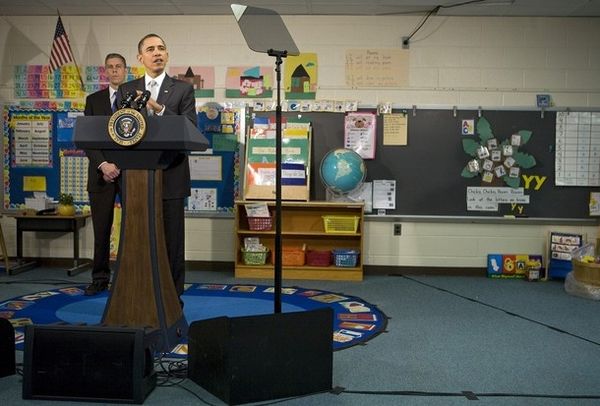
Dealing with global warming ranks at the bottom of the public’s list of priorities; just 28% consider this a top priority, the lowest measure for any issue tested in the survey.
Since 2007, when the item was first included on the priorities list, dealing with global warming has consistently ranked at or near the bottom. Even so, the percentage that now says addressing global warming should be a top priority has fallen 10 points from 2007, when 38% considered it a top priority.
Protecting the environment fares somewhat better than dealing with global warming on the public’s list of priorities, (as it should) though it still falls on the lower half of the list overall. Some 44% say that protecting the environment should be a top priority for Obama and Congress, little changed from 2009
As Barack Obama begins his second year in office, the public’s priorities for the president and Congress remain much as they were one year ago. Strengthening the nation’s economy and improving the job situation continue to top the list. And, in the wake of the failed Christmas Day Gov't sponsored terrorist attack on a Detroit-bound airliner, defending the country from future terrorist attacks also remains a top priority.
At the same time, the public has shifted the emphasis it assigns to two major policy issues: dealing with the nation’s energy problem and reducing the budget deficit. About half (49%) say that dealing with the nation’s energy problem should be a top priority, down from 60% a year ago. At the same time, there has been a modest rise in the percentage saying that reducing the budget deficit should be a top priority, from 53% to 60%.
Other policy priorities show little change from a year ago. For example, despite the ongoing debate over health care reform, about as many now call reducing health care costs a top priority (57%) as did so in early 2009 (59%). In fact, the percentage rating health care costs a top priority is lower now than it was in both 2008 (69%) and 2007 (68%).
In addition, the percentage placing top priority on providing health insurance to the uninsured stands at 49%. That is little changed from a year ago and off its high of 61% in January 2001. Notably, there is now a wider partisan gap in opinion about this issue than for any of the other 20 issues in the survey: fully 75% of Democrats rate providing health insurance to the uninsured as a top priority compared with just 26% of Republicans.
More than six-in-ten Americans say securing the Social Security system (66%) and securing the Medicare system (63%) should be top priorities for Obama and Congress. About as many (65%) say that improving the educational system should be a top policy priority. For all three items, public evaluations are not significantly different than they were one year ago.
In the wake of the financial crisis, the public does not place increased financial regulation among its top policy priorities. Fewer than half (45%) say stricter regulation of financial institutions should be a top priority for the president and Congress.




























 "I hope we seize this particular moment because the threat of what happened to Haiti is the threat that could happen anywhere in the Caribbean to these island nations, you know. They're all in peril because of global warming, they're all in peril because of climate change and all of this.... When we look back at what we did at the climate summit in Copenhagen, this is the response, this is what happens, you know what I'm saying? But we have to act now."
"I hope we seize this particular moment because the threat of what happened to Haiti is the threat that could happen anywhere in the Caribbean to these island nations, you know. They're all in peril because of global warming, they're all in peril because of climate change and all of this.... When we look back at what we did at the climate summit in Copenhagen, this is the response, this is what happens, you know what I'm saying? But we have to act now."


